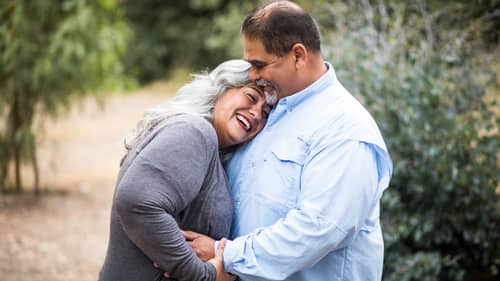Find the Best Resources for You
Each mental wellness journey is unique, so what you need might look different from what others need. We’ve gathered a wide variety of resources ranging in topics and support needs. Flip through to find the best options for you.
-

Stigma
Mental health stigma can prevent people from seeking the help they need, leading to feelings of shame and isolation.
-

Support
The link between social support and mental wellness is strong.
-

Mindfulness
Mindfulness increases self-awareness, self-acceptance, and self-compassion.
-

Coping Skills
Coping skills help regulate emotions, have effective communication, and navigate stress.
-

Resources
A list of books, resources, and activities to try.
-

Helping a Loved One
You can be an effective part of your loved one’s support system.
Understanding Mental Health Stigma
Mental health stigma often arises from a lack of understanding, misinformation, and long-standing cultural beliefs that unfairly associate mental health challenges with “weakness” or “failure.” This stigma can prevent people from seeking the help they need, leading to feelings of shame and isolation.
Challenging mental health stigma is crucial because it opens the door to more honest conversations, encourages early intervention, and promotes a culture of empathy and support. By addressing and dismantling these misconceptions, we can create a more inclusive society where everyone feels empowered to prioritize their mental well-being without fear of judgment.

Support Through Community Connection
When we’re surrounded by people who accept us fully for who we are, we’re more likely to feel supported, loved and valued. That’s one of the reasons such a strong link exists between community and mental health. Human beings tend to thrive when they’re in communities — and struggle more in isolation.
Increase your community by learning more about what type of community would be most helpful to you, joining a support group, or connecting with others online through platforms like Facebook or Instagram.

Practicing Mindfulness and Meditation
According to psychotherapist Dr. Russ Harris, mindfulness is simply "paying attention with openness, curiosity, flexibility, and kindness." Mindfulness can help us increase self-awareness and develop self-acceptance and self-compassion. Practicing mindfulness can be a powerful way to experience more balance, calm and peace. Mindfulness doesn’t mean we won’t experience any difficult emotions or thoughts, but it can help us be less reactive to these experiences – acting within our wisdom and values when moving through challenges.
Many of us think of mindfulness as the same as meditation. But that is actually not true. While meditation can be a great way to access mindfulness, you don’t have to use it in order to practice mindfulness. Allow yourself to pick the mindfulness or meditation practices that are most helpful to you.

Developing Coping Skills for Mental Health
Learning coping skills is an important part of developing and maintaining mental wellness. Coping skills can help us regulate our emotions, have effective communication with others, and navigate stressful situations. Whether you’re just starting out or need some refreshers, these resources can provide you some tips for where to start.

Recommended Resources
Books to Read
- A Liberated Mind: How to Pivot Toward What Matters – Steven Hayes, PhD
- Fierce Self-Compassion: How Women Can Harness Kindness to Speak Up, Claim Their Power, and Thrive — Kristin Neff, PhD
- Get Out of Your Mind & Into Your Life: The New Acceptance & Commitment Therapy – Steven Hayes, PhD and Spencer Smith
- Mind Over Mood: Change How You Feel by Changing the Way You Think, (2nd Edition) – Dennis Greenberger, PhD, Christine A. Padesky, PhD
- Rest is Resistance: A Manifesto — Tricia Hersey
- The Body Is Not An Apology: The Power of Radical Self-Love — Sonya Renee Taylor
- The Happiness Trap (2nd Edition) – Russ Harris
- The Mindful Couple – Robyn Walser and Darrah Westrup
- The Mindful Self-Compassion Workbook – Kristin Neff, PhD and Christopher Germer, PhD
- The Worry Trap: How to Free Yourself from Worry & Anxiety Using Acceptance and Commitment Therapy – Chad LeJeune Ph.D.
Apps to Download
- Insight Timer — Guided meditations for sleep, anxiety, and stress.
- I Am — Dailly affirmations to build self-love and self-confidence.
Activities to Try
- Recovery Day Activity Journal — Mindfulness activities and coloring pages from our Recovery Day journal.
- Family and Friends Guide for Self-Care, Resilience, and Hope — Educational resource for caregivers that includes self-care tools and self-discovery prompts.
- Say It Brave Courage Cards — Cards for students to spread mental health awareness on college campuses.
Accounts to follow
- @asianmentalhealthproject — Asian Mental Health Resources
- @glsen — LGBTQ+ Student Resources
- @mentalhealthamerica — Mental Health Education and Resources
- @pathlightbh — Mental Health Education and Resources
- @she_recovers — Recovery Community and Resources
- @thelovelandfoundation — Black Mental Health Resources
- @translifeline — Trans Mental Health Resources
- @twloha —Suicide Prevention Resources
Helping a Loved One

Need More Support? Learn About Treatment Options.
When mood, anxiety or trauma-related disorders start to impact our day-to-day lives, and we’re unable to manage symptoms on our own or with outpatient care, it’s time to consider a little extra support. Pathlight Mood & Anxiety Center offers a full spectrum of mood, anxiety and trauma-related services for children, adolescents and adults of all genders. We are committed to an environment of cultural humility: grounded in a foundation of safety, mindfulness, and awareness to ensure the best environment for engagement, learning and recovery.
-

Treatment and Services for Children and Adolescents
When your child is struggling with a mood and anxiety disorder, their pain is your pain. This experience can feel distressing, isolating and – at times – hopeless. Pathlight’s goal is to guide you and your child on a path to long-lasting change, healing, and life-changing recovery. -

Treatment and Services for Adults
Pathlight’s adult programming offers mood and anxiety disorder treatment for all genders ages 18 and older — bringing together a highly experienced, multidisciplinary team of experts to address the physical, psychological and social implications of these conditions.
Speak With a Mental Health Professional Today
Connect with an experienced mental health professional to understand how Pathlight can help you or your loved one. This conversation is free and there is no commitment required. We're here to help. Call us at 877-711-1878 or schedule a time to talk.

Hide Last Child Layout Div
